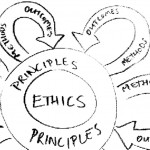 A day after the World Health Organization (WHO) ethics panel released their summary to consider and assess the ethical implications for clinical decision-making of the potential use of unregistered interventions for treating Ebola Virus Disease (EVD), and the Canadian government’s decision to donate up to 1,000 experimental vaccines to the WHO to distribute, one well-known bioethicist gave his thoughts on the matter in an NBC News Op-Ed.
A day after the World Health Organization (WHO) ethics panel released their summary to consider and assess the ethical implications for clinical decision-making of the potential use of unregistered interventions for treating Ebola Virus Disease (EVD), and the Canadian government’s decision to donate up to 1,000 experimental vaccines to the WHO to distribute, one well-known bioethicist gave his thoughts on the matter in an NBC News Op-Ed.
Drs. William F and Virginia Connolly Mitty Professor and head of the Division of Bioethics at New York University Langone Medical Center inNew York City, Arthur Caplan, PhD answered the following questions concerning the Canadian vaccines–With such a limited supply, who should get them? And what do they need to be told?
Caplan writes:
“The most ethical way to distribute limited experimental vaccine, is, as the WHO ethics group noted, with an eye toward collecting information on safety and efficacy. Rather than just handing out vaccine to a small group of people in countries that have seen Ebola outbreaks, it is important to learn as much as possible about whether the vaccine has any efficacy in humans and is safe.”
“That means those who ought gain access first are those at greatest risk of exposure to Ebola—health care workers, families of those caring for a sick person, those involved with handling the dead.”
Dr. Caplan also notes that things like informed consent, appropriate follow-up be available and information concerning adverse events be made available.
Caplan closes with, “Canada’s decision is humane and ethical. The WHO now must ensure that the gift is used wisely to learn whether making and distributing more vaccine now and in the future makes scientific and ethical sense.”
Source: Outbreak News Today

















